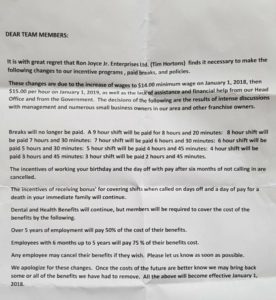Four days into the unprecedented hike, some workers are feeling the blowbacks

There is no quick and easy fix for workers who suddenly find themselves losing compensation or benefits as part of employers’ pushback against Ontario’s minimum wage hike, experts say.
Four days into the unprecedented hike from $11.60 to $14 per hour, some workers are being subject to blowback from the legislation meant to protect them from precarious work.
“These changes are due to the increase in wages to $14.00 minimum wage on January 1, 2018, then $15.00 per hour on January 1, 2019, as well as the lack of assistance and financial help from our Head Office and from the Government,” the Cobourg franchise owners, who are also heirs of the company’s co-founders, said in a letter to employees.

Paid break times are nixed, among other losses.
Employment and labour lawyer Jason Beeho, a partner with Levitt LLP, said these changes are the company’s prerogative.
“Short of this being a dramatic reduction of compensation and benefits, these types of changes are at the discretion of the employer,” he told CBC News.
Constructive Dismissal Claim
But if a worker believes that, when quantified, any rollbacks they are facing constitute a dramatic reduction, they can pursue a constructive dismissal suit. That’s when an employee argues that the changes are so significant they constitute a fundamental change in the position. Experts say both the threshold and the risk for this argument are high.
“When you have incremental changes being made and they net out to less than 5 per cent, even 10 per cent, of the employee’s overall compensation, there isn’t a great argument to be made,” Beeho said.
In this type of suit, the worker is essentially saying that the contract is over and is asking for a termination package. So, “if you sue for constructive dismissal and you lose, you get nothing and you’re also out of a job,” employment lawyer Ryan Wozniak said.
Even if the worker successfully argues a constructive dismissal case, the end result would still be a lost job.
Civil Court vs. Ministry of Labour Complaint
If a worker chooses to, nonetheless, go the way of a constructive dismissal case, there are two main avenues of recourse; a civil court case or a Ministry of Labour complaint.
While a complaint under the Employment Services Act is typically cheaper and “marginally quicker,” Wozniak said it’s usually a smaller payout.
“The Employment Standards legislation provides minimum standards not maximum standards, so it’s the floor and common law provides the ceiling,” he said.
Complaints not anonymous
The Ministry of Labour invites employees who think their employer has not followed the Employment and Standards Act, regarding constructive dismissal or any other violation, to file a claim and it will investigate on a case-by-case basis.
But workers sometimes stay away from these complaints because they are not anonymous, employee advocate Deena Ladd said.

Ladd is the co-ordinator of Workers’ Action Centre, a non-profit that advocates for workers’ rights. She said that organizations like hers can provide one-on-one support for workers facing sudden changes in their employment.
“Each person’s situation is completely different,” she said in an interview. “It could be a situation where someone may be not getting paid overtime or maybe their employer is not willing to pay them the $14 or is rolling back another benefit or another condition of work.”
“The first thing is to get some advice that we can work with you to figure out what to do in these situations,” she said.
The organization offers to help employees file complaints and communicate with the employer on behalf of the employee, as well as provides legal referrals and more.
Other legal avenues
Wozniak said that while a constructive dismissal claim may be the most obvious route to go in these cases, there may be other legal avenues that could be explored.
For instance: “If people are required to work more because they’ve now absorbed someone else’s job duties because that person has been let go, they could potentially make an overtime claim,” he said.
It depends on how the employer pushes back against the legislation, he explained.
But despite the rocky start, Ladd said she is optimistic that the majority of employers will get on board with the changes.
“This is about pushing for a minimum wage that is poverty-free,” she said. “That’s a Canadian value.”


